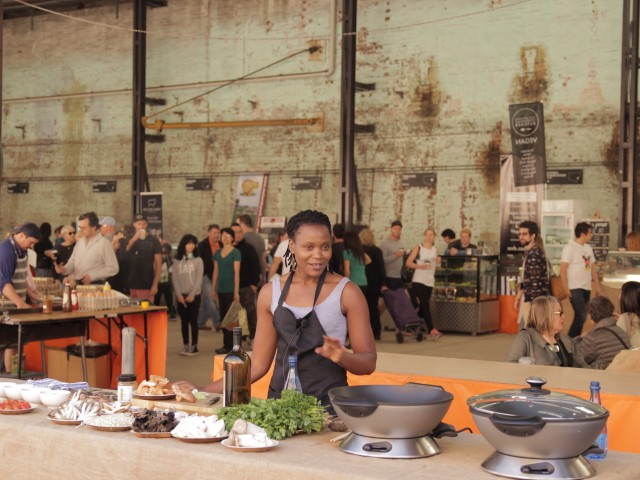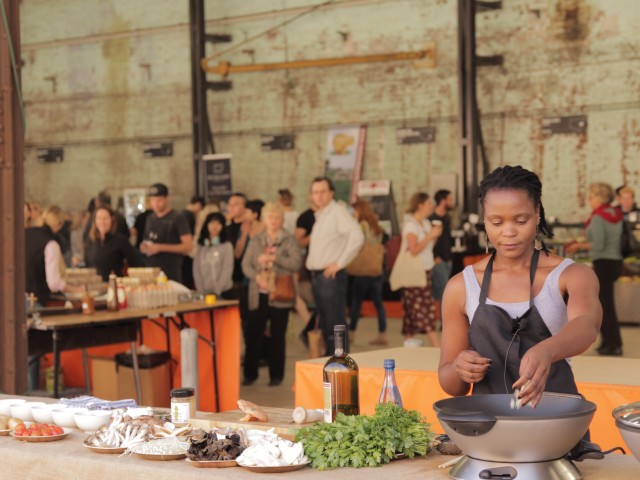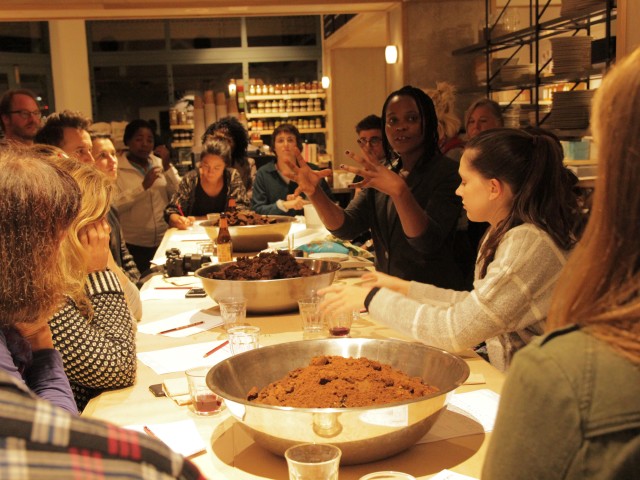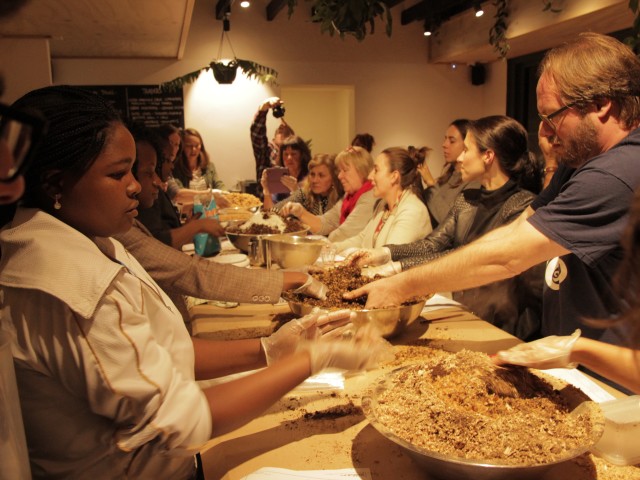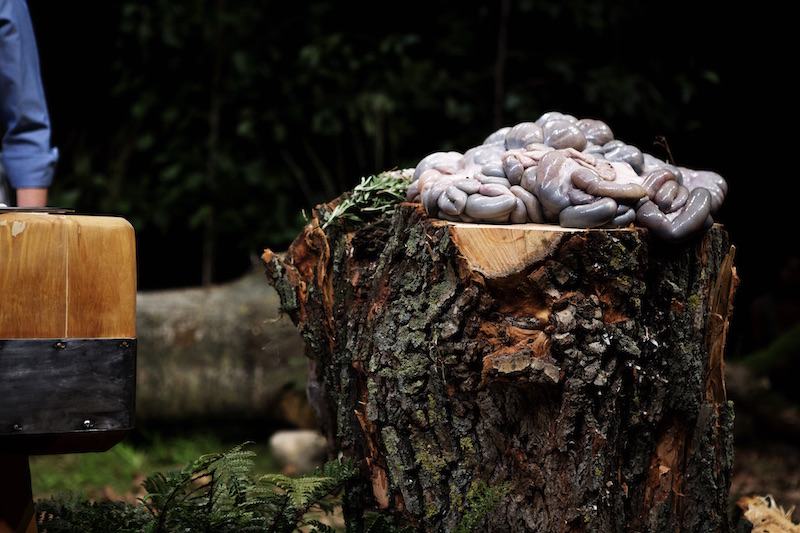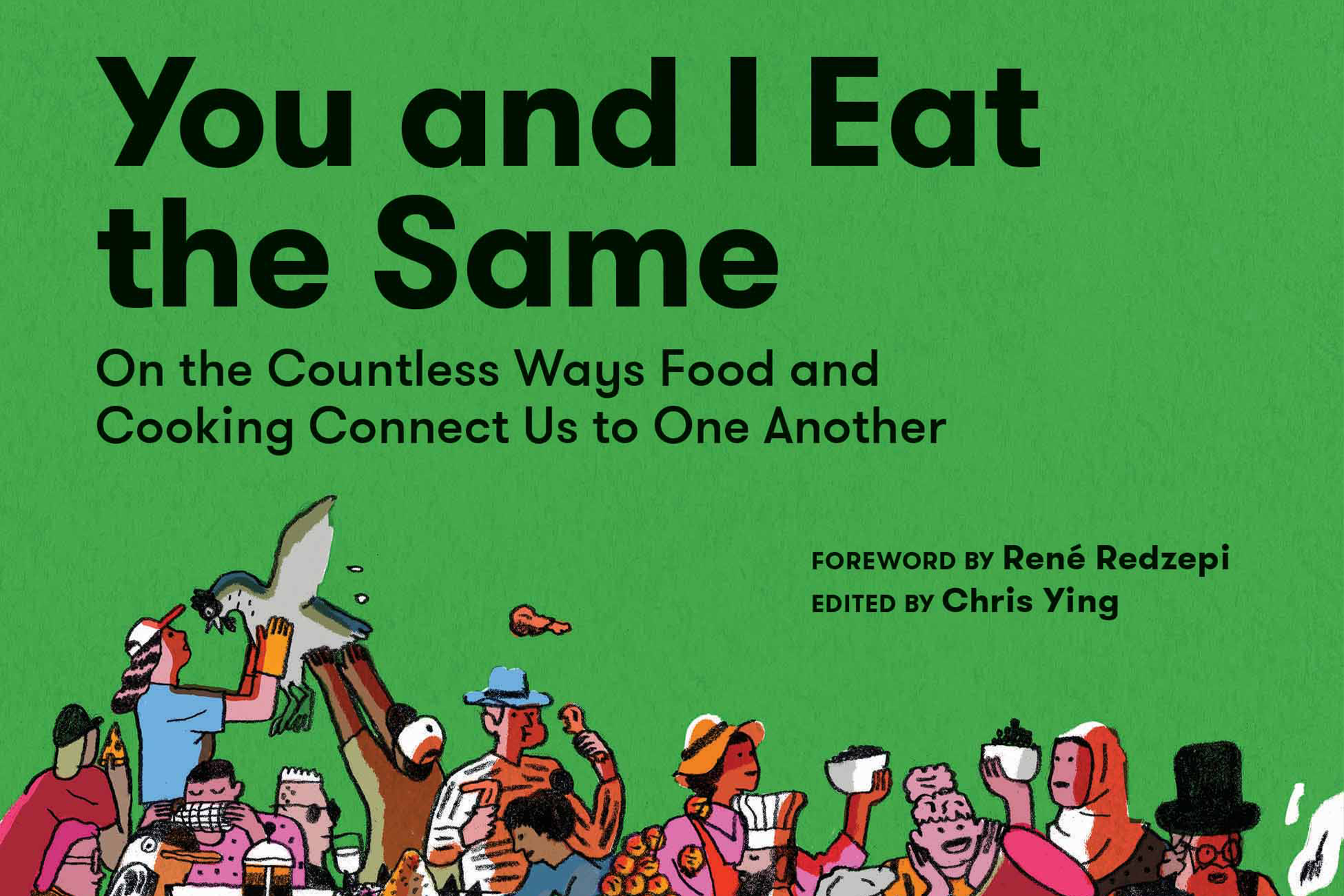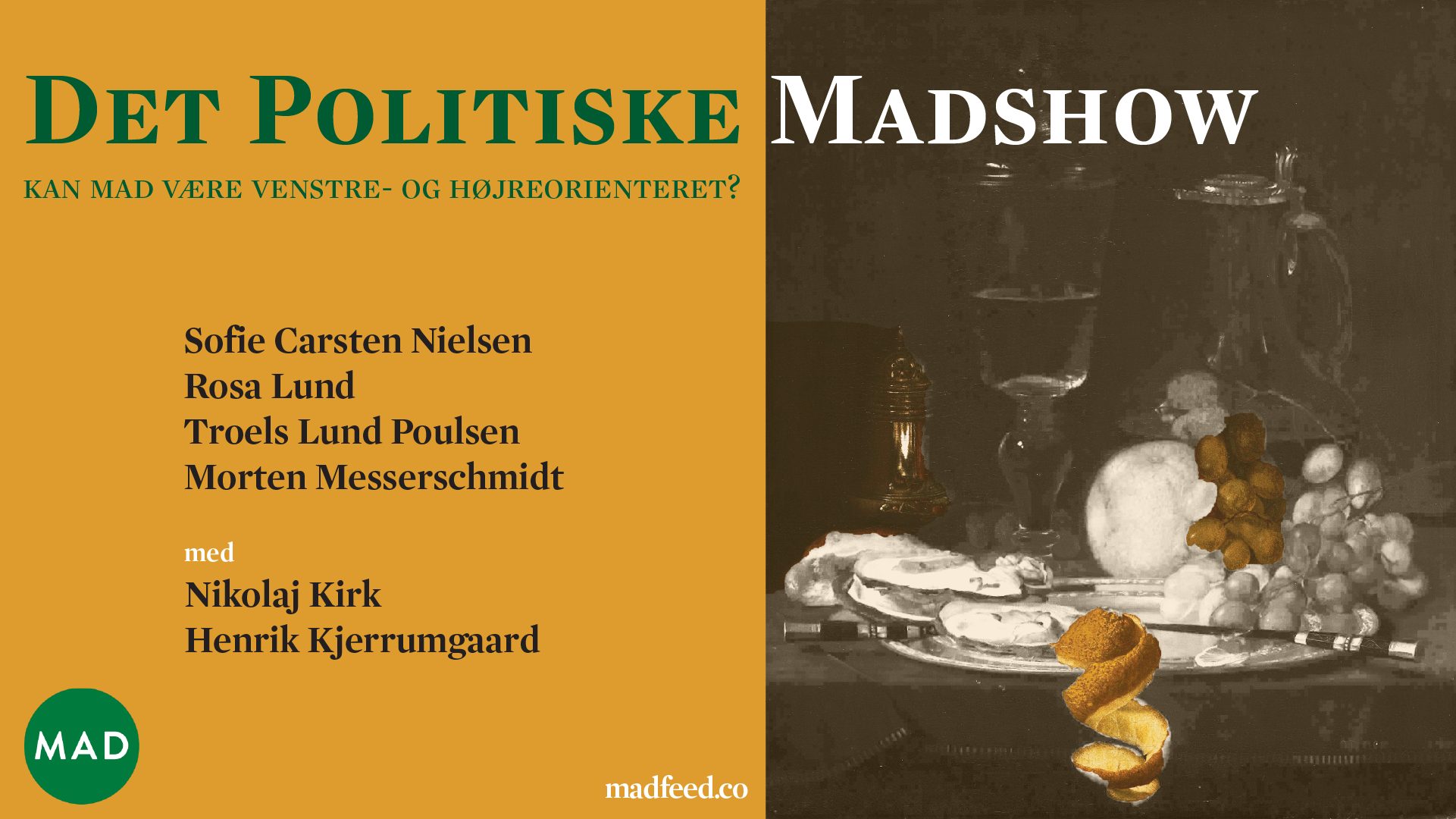A Mushroom of One’s Own
Nancy Lee has a PhD in Gender and Cultural Studies from the University of Sydney, Australia. Her dissertation examined the impact of social media and celebrity culture on chefs’ modes of production. She tweets and ‘grams at @pre_dessert
My first real interaction with MAD was a complete fluke. After emailing them about attending the MAD5 Symposium, I met one of the Danish MAD team members last year. It turned out he was one of seven humans in the world who has read my PhD dissertation, which I wrote about chefs. He suggested meeting for drinks. This resulted in hours at Barangaroo – the home of noma Australia – debating the pros and cons of capitalism in the 21st century, and the radical action needed for socialism to work, if even socialism is the way to go. Emboldened by gin, I implored, ‘MAD needs to Be More Radical!’ His response was, ‘Read more Žižek!’ followed up with five articles he suggested I read.
It was my first inkling that MAD is not your average not-for-profit.
Indeed, MAD is refining its mission, encouraging its network of chefs, producers, and scholars to connect and learn about issues from different perspectives. At MAD5 I co-presented a paper on the impact of food critics on labour and cultural value in restaurants to a tent full of food critics. The conversation became quite heated, but it was one of the best, most fun, and yet vaguely terrifying things I’ve ever done. I had an incredible time at the Symposium and learned that sometimes a mutual love-in isn’t always a bad thing. When you go to events like MAD, you’re aware some of it is going to be a bit self-congratulatory. Some chefs smirked to me, ‘What a circle jerk, right?’ before raving about Jacques Pepin’s deboning skills instead. Why ‘think’ and ‘talk’ when you could just do? But there is something to be said about being in the company of people who truly want to make a difference in the world. This cynic was won over, and I have been lucky enough to collaborate with MAD ever since.
MAD seeks to encourage change through conversation and nurturing ideas, but they also realise that there are practical aspects to enabling action. Chido Govera is changing the lives of women through mushroom farming. A scholarship from MAD facilitated her trip to Australia in April 2017 to share some of her work in Sydney and Melbourne. MAD hopes, with the right support, to fund more such scholarships in the future.
When you meet Chido Govera, her luminous smile is the first thing you notice. It’s completely disarming, and her friendly warmth immediately puts you at ease, but Chido’s quick smile belies her storied past. At a young age, Chido had to choose between an education and learning to grow mushrooms. Chido has, at 31, lived a life many of us could hardly fathom – orphaned at seven years old in Zimbabwe, almost a child bride at 11, abuse at the hands of those she should have been able to trust – resulting in post-traumatic stress disorder at 19. Now, she is a mushroom farmer and activist who founded The Future of Hope Foundation in 2013. She is also the adoptive mother of several young Zimbabwean orphan girls, and teacher of many more.
In 2011, a friend of René Redzepi’s saw Chido speak at a DO Lecture in the UK, which resulted in an invitation to speak at MAD2: Appetite. Afterwards, René told her he would support her in any way he could, and since then, she has continued to collaborate with MAD to expand her Foundation. This included working with noma’s and MAD’s former heads of Research and Development, Lars Williams, and Dr Arielle Johnson respectively, on product testing in Zimbabwe, where they experimented with fermenting, oils, pickling, and learned about rebuilding topsoil.
Sydneysiders were first introduced to Chido at MADSyd, a half day of talks at the Sydney Opera House in 2016. A packed out Concert Hall heard about how she forged a path out of poverty by learning to grow mushrooms from food waste. In Zimbabwe, 70% of agricultural labour is provided by women, though they are far less likely to own land than men, and their access to land is entirely controlled by men. But mushrooms can be grown in a small room. Chido trains young orphan girls to grow oyster mushrooms that they can sell in marketplaces to become financially self-sufficient.
Chido has made many friends in the MAD community, including Kylie Kwong, who also spoke at MADSyd and was a MAD Yale Chef Fellow. “I was incredibly moved when I first learned of Chido’s story at MADSyd,” Kylie recalls. “For one so young, Chido embodies an incredible depth, wisdom and understanding of life, love and loss… I love Chido because she not only shows compassion for others, but she also shows deep compassion for herself. For me, this is the sign of a truly enlightened being.” It was also at MADSyd where Chido met social researcher Dr Rebecca Huntley. Both women spoke about food security and social inequality, and bonded backstage. “MADSyd was such an inspirational day and meeting Chido was such a revelation, I decided I had to do more,” Dr Huntley recalls. “Over dinner with the other MADSyd participants I told Chido I wanted to correspond with her and see if I could organise for her to return to Australia for an extended period of time.” Over a year, Rebecca and Chido kept in touch and in April, Chido travelled to Australia again to talk about her work cultivating mushrooms and training young women and girls in mushroom farming. MAD granted Chido a scholarship to make the trip with two of her daughters, Annah and Perse. Rebecca generously built Chido’s itinerary, bringing her network into the fold to enrich the trip, from support for accommodation to nationwide media engagements.
As part of her ‘tour’ of Sydney and Melbourne, Chido ran a mushroom growing workshop, spoke at events with The School of Life, Sydney Ideas, and to various Australian media outlets, including popular panel program Q&A, on which she appeared with Germaine Greer and several Australian politicians. With Kylie Kwong, she ran a short mushroom cooking demonstration at the popular Carriageworks Farmers Market. The trip also included visits to Parwan Valley mushroom farm, a modern agaricus mushroom farm in Victoria, and to Li Sun exotic mushrooms in New South Wales.
The Sydney Ideas talk was moderated by Dr Alana Mann, a media and food studies academic at the University of Sydney, whose work explores the links between food sovereignty and activists. During their conversation, Chido explains in detail how her training works. Her foundation identifies women and girls who are orphans, then partners with the local school to organise training. She spends two weeks at a time teaching young girls and women to grow mushrooms. At the end of the training period they are given their own mushroom starter kits. Once they’ve grown mushrooms, the foundation negotiates on their behalf with markets to ensure buyers, after which a quota must be met to repay any money spent on setting up shop. This way, it is not seen as merely ‘charity’, but a goal for the women to work towards. Once successful, businesses may be selected to be part of the for-profit arm of the Foundation. The for-profit structure ensures sustainability and accountability; in this instance, capitalist materiality subverts an oppressive system.
At the end of every event – mostly attended by women, for it is perhaps women’s work to hear how other women negotiate economic oppression – attendees flock to Chido to talk about her work and her experiences. Chido’s story seems to resonate on some deeper level with the women who come to see her. Our lives in Australia are by no means comparable with Chido’s in Zimbabwe, but hearing how communities are galvanised when women claim a stake in the system – both food and economic – strikes a chord. “I know I am not going to end world hunger,” Chido concedes. “But I can at least look at what is happening in my community, and do something about it. For me, mushrooms represent opportunity.”
When demand for ‘Hope’ mushrooms increases, so too does the realisation that mushroom growing is a feasible way to make a living for the girls and women Chido meets, and a way out of life as a child bride. “I have nothing against marriage,” Chido says. “I think I’d like to get married one day. But I don’t want it to be rushed. I don’t want it to be rushed for my girls, either.” One young man in the Sydney Ideas audience asks, “How can people in Western countries contribute?” Chido’s response is straightforward: “Trust that the local community knows what the issues are; locals need to take the lead to develop a solution. But we also need research from as many people as possible.”
While Chido relishes the chance to learn new things all the time, the ultimate goal is for organisations to visit her training centre in Harare one day, and to learn from her and the system she has built. That goal may become reality sooner rather than later: on this trip to Australia, Chido was offered the chance to work and research alongside world-renowned mycologist, Paul Stamets. He heard her story on the radio, and personally offered her a research scholarship.
Chido plans to expand her program into Rwanda and Kenya by the end of the year. She wants to raise more money to put towards training, buying a minivan, and to complete building on her property so she can house more girls and provide better training facilities. With a name like The Future of Hope, Chido is often asked what ‘hope’ means. “It’s not a river you cross once. It’s not like, I got through it, now I have hope. This is the power of hope: you can feel the pain of the moment, but you also know you have so much to look forward to.” Chido is indelibly informed by her past, but the future she has built for herself is full of hope. “It’s part of my healing process, doing what I do; I’m also helping myself. I get to have the childhood I never had.”
Inequality is often the result of structural and institutionalised oppression. I would not like to promote the idea that individuals can pull themselves out of abject poverty through sheer will, for example. This is not a story about the power of the individual, but rather what an individual can do with a confluence of the right kinds of opportunities offered at the right time. In this case, Chido Govera used those opportunities to make changes in the system for women in her community. The positive impact of women’s agency in agriculture is a product of Chido’s work and conviction, shared through channels like MAD, and it continues to change the system.
It seems fitting, now, that the most difficult chapter of my dissertation to write was the chapter I wrote about MAD. MAD and its attendant glamorous celebrity culture highlighted to me the privilege and authority afforded by media attention and seemingly arbitrary measures of cultural and social value. It could be easy to go to an event like MAD5, enjoy the natural wine and excellent hospitality, then head home to regular life without a second thought. For me, standing and arguing with a crowd of defensive food critics is seared into my memory not just because of all the shouting, but the quiet conversations that happened afterwards: ‘Why do we encourage ‘cheap eats’?’ ‘How are food ‘critics’ different to ‘food writers’?’ ‘What even is The Media?’ I came away from MAD5 full of more questions, perspectives, and feelings. Žižek, of course, would dismiss the notion of any meaning or impact from such a love-in. It’s false engagement. A circle jerk for sure. It may make us feel good, but it won’t make any difference. And yet, through doing things like collaborating with Chido Govera, or opening up a conversation about chefs’ mental health and labour, or questioning power structures within the media or the politics of migration, MAD perseveres. Perhaps that is a good start to being more radical.
You can donate to the Future of Hope Foundation here, or (if you happen to be Australian) here.

